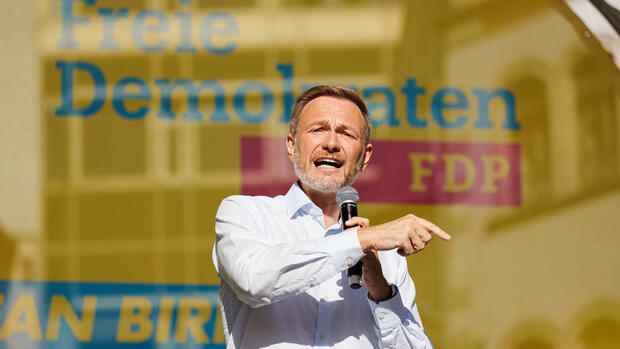The state election in Lower Saxony is the fourth electoral defeat for the FDP this year. First the end in Saarland, then the loss of government participation in Schleswig-Holstein and North Rhine-Westphalia and now the debacle in Hanover. It’s no wonder that many liberals, who never felt happy in the coalition with the SPD and the Greens in the federal government, are getting angry. The messages on Sunday evening were unambiguous: keep your back and stand up for your own positions, even if it can ultimately lead to new elections.
Such reactions are understandable after an election debacle, but ultimately lead to nothing. What result could the Liberals hope for in new elections? 11.5 percent again as in the 2021 federal election? A purely rhetorical question. In addition, no one would understand how to get out of the government in the middle of this crisis and paralyze the country with an election campaign for months.
>> More on the topic: Beware of the savior state: Nobody says who should pay
Instead, the FDP has to do its job. If party leader Christian Lindner has delivery problems with the promises of solid budget management, bureaucracy, digitization or research and innovation, it is not enough to point to the coalition partners SPD and Greens, who stand in the way of modernizing the country.
Top jobs of the day
Find the best jobs now and
be notified by email.
It was clear from the start that the coalition partners had a different country in mind than the FDP when it came to transforming itself into an ecological and social market economy. The liberal electorate saw the alliance more as a millstone anyway and increasingly feels that this assessment has been confirmed.
Personal responsibility and willingness to change
The FDP voter wants a federal finance minister to look after the budget. SPD and Greens believe that the state can accompany everything and everyone through the crisis. The Chancellor sends out the message: You’ll never walk alone. The FDP relies on personal responsibility and willingness to change. But that doesn’t mean leaving citizens and entrepreneurs who need help out in the rain.
The two coalition partners still want to phase out nuclear power, coal and the internal combustion engine as quickly as possible. The FDP is not fundamentally opposed to this, but does not want to jeopardize Germany as a business location and is thinking of the associated jobs.
Does that lead to many quarrels about the future of the country? Yes, it does – and it is necessary. Dispute is part of democracy, as is compromise. But what is communicated poorly or not at all is the political responsibility that the FDP has assumed. It was CSU Prime Minister Markus Söder who brutally drove the election campaign of CDU chancellor candidate Armin Laschet against the wall. It was also the CSU that prevented the last possibility of a Jamaica coalition. It was the FDP that took responsibility.
But it’s not enough to blame the coalition partners and lament day and night about compliance with the debt brake and the SPD and Greens’ ever new spending requests. Liberals must also look inward. FDP leader and Federal Minister of Finance Lindner is driving at high speed anyway, while his other ministerial colleagues often fly under the radar of the public.
Digitization and bureaucracy reduction is a top priority
Digitization was once the party’s big campaign hit. This is how you got from the APO to the Bundestag. The government is responsible for pointing out that the lion’s share of the financial resources would have already been used up by the fiber optic expansion. In addition, it is a cross-sectional task in which all ministries have to deliver.
>> Read also: Comeback for red-green, fear of populists: Six lessons from the Lower Saxony election
So everyone is to blame if nothing goes forward. Then one could have done without a digital ministry. The trick is to do politics without money. To do this, Transport Minister Volker Wissing must first see himself as a digital minister. As much as he is committed to a successor model for the 9-euro ticket. The prosperity of tomorrow lies in digitization and in innovation and research.
This is where Research Minister Bettina Stark-Watzinger, who is well connected in the scientific community, comes into play. But medium-sized companies also live from innovation and research. Especially in difficult times, a close integration of small and medium-sized companies would be important. The corporations take care of it themselves, the middle class cannot afford it.
The to-do list never ends. The classic FDP voter wonders why Federal Justice Minister Marco Buschmann hasn’t made reducing bureaucracy a top priority for a long time. There is no other topic that concerns hundreds of thousands of companies. The Regulatory Control Council responsible for this was relocated from the Chancellery to the Federal Ministry of Justice. Now he leads a shadowy existence there.
Small and medium-sized companies, craftsmen or freelancers need a business party that also fundamentally sees itself as such. A start has been made with the dismantling of the cold progression. But the fact that Robert Habeck is Economics Minister does not mean that the issues should be left to the Greens. It’s just not enough to constantly argue with the green Federal Minister of Economics about the finances.
If no minister puts innovation, trade policy or simply the development of a quantum computer at the top of the agenda, then the parliamentary group should do it. At the end of the day, the message has to be: Germany can face a crisis if the FDP does it right.
More: “I’m making a loss with every roll now” – An entrepreneurial country at the limit.
